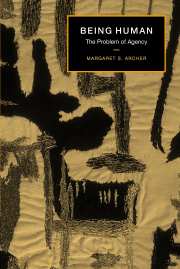Book contents
- Frontmatter
- Contents
- List of figures
- Acknowledgements
- Introduction
- Part I The impoverishment of humanity
- Part II The emergence of self-consciousness
- Part III The emergence of personal identity
- Part IV The emergence of social identity
- 8 Agents: active and passive
- 9 Actors and commitment
- Conclusion: the re-emergence of humanity
- Index
9 - Actors and commitment
Published online by Cambridge University Press: 22 September 2009
- Frontmatter
- Contents
- List of figures
- Acknowledgements
- Introduction
- Part I The impoverishment of humanity
- Part II The emergence of self-consciousness
- Part III The emergence of personal identity
- Part IV The emergence of social identity
- 8 Agents: active and passive
- 9 Actors and commitment
- Conclusion: the re-emergence of humanity
- Index
Summary
To view Social Agency in terms of interrelations (interactions between groups and collectivities which redefine both through re-grouping) obviously means that this concept of the Social Agency (always in the plural) is not synonymous with the notion of the Social Actor (in the singular). There is a good deal more to be said about the Social Actor, most especially how she or he acquires an identity as a social self. The next emergent stratum thus concerns the Social Actor who emerges through the ‘triple morphogenesis’ in which Agency conditions (not determines) who comes to occupy different social roles. Actors, then, are defined as role incumbents and roles themselves have emergent properties which cannot be reduced to the characteristics of their occupants. These can be demonstrated by the pre-existence of roles, their greater durability over time, a capacity to endure despite considerable changes in the personal features of their successive holders, and the relatively autonomous powers of constraint and enablement which are lodged in the role, not the occupant, and can be lost (or shed) with loss of occupancy.
Just as the concept of Social Agency is necessarily incomplete for dealing with Actors, since it is only concerned with action in, or as part of, a collectivity, equally, however, any attempt to conceptualise the Social Actor needs to be completed by reference to their properties as Agents, if we are finally to arrive at an adequate conception of social identity and how it is attained.
- Type
- Chapter
- Information
- Being HumanThe Problem of Agency, pp. 283 - 305Publisher: Cambridge University PressPrint publication year: 2000
- 1
- Cited by



